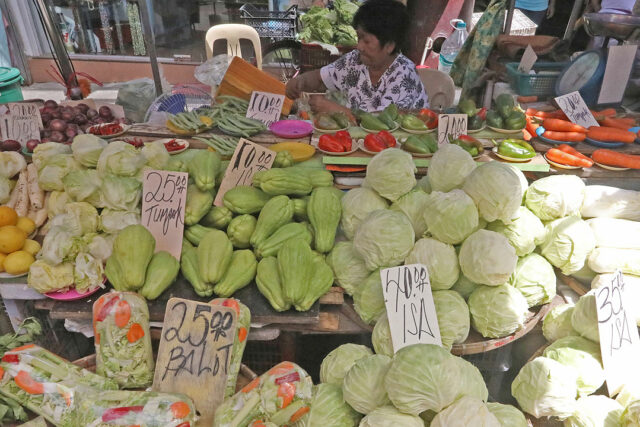BSP sees 7.1-7.9% inflation in Oct.

INFLATION may accelerate as much as 7.9% in October, driven by rising food prices, higher transport fares and the peso depreciation, the Bangko Sentral ng Pilipinas (BSP) said on Monday.
“The BSP projects October 2022 inflation to settle within the range of 7.1% to 7.9%,” it said in a statement.
If realized, October inflation would exceed the central bank’s 2-4% target for the seventh straight month. This would also be faster than the 6.9% seen in September and 4% in the same month last year.
The upper end of the BSP’s inflation forecast or 7.9% would be the quickest in over 14 years or since the 9.1% print in November 2008.
A BusinessWorld poll of 14 analysts conducted last week yielded a median estimate of 7.2% for annual inflation in October.
“More importantly, inflation is projected to gradually decelerate in the succeeding months as the cost-push shocks to inflation due to weather disturbances and transport fare adjustments dissipate,” the BSP said.
The Philippine Statistics Authority (PSA) will release October inflation data on Nov. 4.
“Inflation pressures for (October) are expected to emanate from transport fare hikes, elevated domestic petroleum prices, higher agricultural commodity prices due to recent typhoons, and the depreciation of the peso,” the BSP said.
In October, the price of gasoline, diesel, and kerosene had a net increase per liter of P0.50, P8, and P4.25 respectively, data from the Energy department showed.
Traditional and modern jeepneys in the same month began implementing the approved fare hike to P12 and P14, respectively. Ordinary passenger buses also hiked the minimum fare to P13.
Prices of agricultural commodities rose in October after a string of typhoons hit the country. Agricultural losses due to Super Typhoon Karding (international name: Noru) reached P3.12 billion, while damage due to Tropical Depression Maymay and Typhoon Neneng hit P594.02 million.
The peso traded around P58 to P59 per dollar during the month. The local unit went back to the P57 level when it closed at P57.97 on Friday.
“This could be offset in part by the reduction in electricity rates for Meralco-serviced areas, lower LPG (liquefied petroleum gas) prices, and reduction in prices of fish,” the BSP said.
Manila Electric Co. said the overall rate for a typical household went down by P0.0737 per kilowatt-hour (kWh) to P9.8628 in October.
LPG prices were reduced by P2.55 per kilogram (kg) or an aggregate P28.05 for the standard 11-kg cylinder in October.
China Banking Corp. Chief Economist Domini S. Velasquez said in a Viber message that it will be “very worrisome” if inflation does hit 7.9% in October, adding that a whole-of-government approach is needed to tackle this issue.
“There are some demand-side inflationary pressures that will be addressed by BSP’s continuous monetary tightening. This is together with providing some stability to the peso to ensure imported inflation is capped,” Ms. Velasquez said.
“However, the food inflation we are experiencing (highest weight and affects the poor the most), can be addressed by other branches of the government. Sufficient supply of all food items should be a priority, especially in this inflationary environment,” she added.
Rizal Commercial Banking Corp. Chief Economist Michael L. Ricafort said inflation is likely to have reached its peak in October as global crude oil prices have declined significantly since March.
He noted recent typhoons that caused agricultural damage may have led to a temporary spike in prices of food and other commodities.
“There would also be relief, reconstruction, reparation, rebuilding, and other rehabilitation activities in hard-hit areas by the storms that could offset any economic output/productivity losses in those areas,” Mr. Ricafort said.
The BSP said it will “continue to monitor closely emerging price developments to enable timely intervention that could help prevent the further broadening of price pressures.”
At its Sept. 22 policy meeting, the central bank raised its average inflation forecast for this year to 5.6% from 5.4% previously, exceeding the 2-4% target.
For 2023, the BSP expects inflation to average 4.1% before easing to 3% in 2024.
The BSP has so far hiked benchmark interest rates by 225 basis points this year to cool rising prices. Its next policy-setting meeting is on Nov. 17. — Keisha B. Ta-asan
